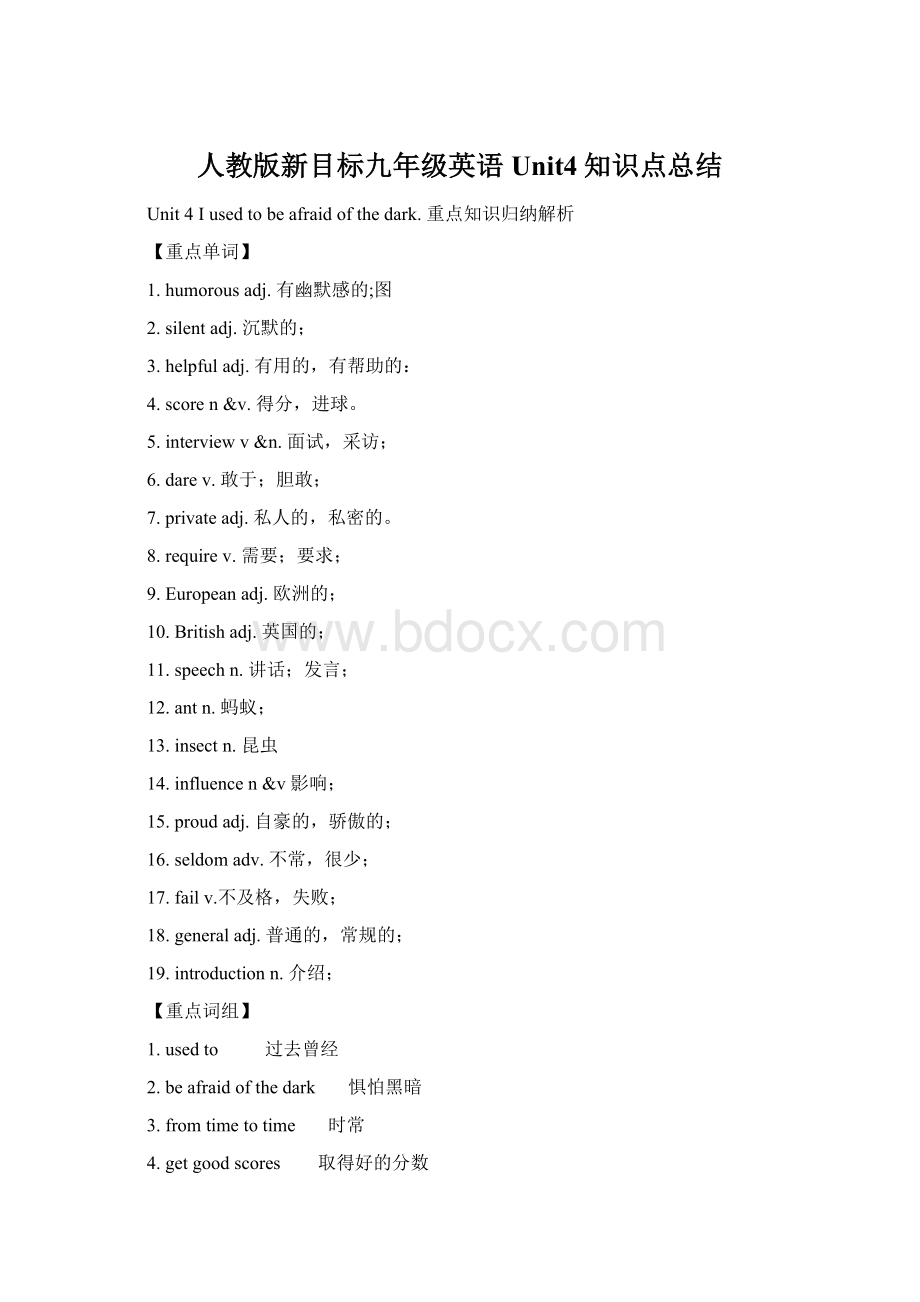人教版新目标九年级英语Unit4知识点总结Word文档下载推荐.docx
《人教版新目标九年级英语Unit4知识点总结Word文档下载推荐.docx》由会员分享,可在线阅读,更多相关《人教版新目标九年级英语Unit4知识点总结Word文档下载推荐.docx(18页珍藏版)》请在冰豆网上搜索。

6.gettonsofattention得到大量的关注
7.readbooksonEuropeanhistory阅读有关欧洲历史的书
8.Africanculture非洲文化
9.bealone独处
10.giveaspeechinpublic作一个公开演讲
11.paintpictures画画
12.benervousabouttests对考试感到紧张
13.influencehiswayofthinking影响他的思维方式
14.beproudof./takepridein为…感到骄傲
15.beabsentfromclasses逃课
16.failtheexaminations考试不及格
17.makeadecision下决心
18.talkwithsbinperson亲自找某人谈话
19.toone’surprise使某人惊讶的是
20.feelgoodaboutoneself对自己充满信心
21.ageneralself-introduction一个简要的自我介绍
22.inthelastfewyears在最近几年
23.remainsilent保持沉默
24.haveagreatinfluenceonsb对某人有很大的影响
【重点句式】
1.---Youusedtobeshort,didn’tyou?
---Yes,Idid.
---你过去个子矮,是吗?
---是的,我是。
2.---What’shelikenow?
---He’stallnow.---她现在是什么样?
---她现在很高。
3.Paulausedtobereallyquiet,shewasneverbraveenoughtoaskquestions.
波拉以前很文静,她从来不够勇敢来问题。
4.It’sthreeyearssincewelastsawourprimaryschoolclassmates.
自从我们上次见到我们的初中同学以来已有三年了。
5.Emilydidn’tusetoeatalotofvegetables,butnowshelovescarrotsandtomatoes.
艾米丽过去不吃许多蔬菜,但是现在她喜爱胡萝卜和西红柿。
6.----Iusedtobenervousabouttestsallthetime.Whataboutyou?
---Yes,metoo.AndIusedtohateP.Eclass.
--我以前对考试一直感到紧张,你呢?
---是的,我也是。
并且我过去还讨厌上体育课。
7.Mylifehaschangedalotinthelastfewyears.我的生活在近几年改变了许多。
【重点知识】
SectionA(1a~2d)
a.词汇包:
beinterestedin对……感兴趣
该短语后接动词-ing形式、名词或代词,其主语必须是人或其他有生命的东西。
它相当于show/take/have/feel(an)interestin,其中interest为名词,意为“兴趣”。
其中be可换用get或become以强调由不感兴趣到感兴趣。
【备课例句】
She’sinterestedincollectingshells.=Sheshowsaninterestincollectingshells.
她对收集贝壳感兴趣。
Hebecameveryinterestedinsciencewhenhewasten.
他十岁时就对科学产生了兴趣。
(以前不感兴趣,十岁时开始)
【横向辐射】interesting&
interest
1.interesting
作形容词,有主动意味,意为“令人有趣的”,作表语时,主语通常是物。
作定语时,既可修饰人,也可修饰物。
【例句】
Thestoryisveryinteresting.这故事很有趣。
Thisisaninterestingbook.这是本有趣的书。
2.interest
作不可数名词时意为“兴趣、趣味”。
作动词时意为“使(人)发生兴趣”,其主语多为事物。
They'
reallplacesofgreatinterestinChina.它们都是中国的名胜。
Yourstoryinterestsme.你的经历引起了我的兴趣。
【课堂变式】
Ihave___totellyou.Maybeyouwillbe_____init.
A.interestingsomething;
interestedB.somethinginteresting;
interesting
C.somethinginteresting;
interestedD.somethinginterested;
interesting
【解析】形容词修饰不定代词时,应该放在其后面,可先排除A。
另外,修饰某物时要用interesting,可排除D。
第二空的you是人,故要用beinterestedin结构。
答案选择C。
b.句式包:
1.Mario,youusedtobeshort,didn’tyou?
马里奥,你过去很矮,对吗?
usedtodosth意为“过去常常做某事”,特指在过去经常发生的动作,而现在已不再发生,其中usedto可以看作情态动词,用于各种人称。
Heusedtoplaysoccerwhenhewasyoung.他年轻时经常踢足球。
(现在不踢了)
SheusedtobeanEnglishteacher.她过去是一位英语老师。
(现在不是英语老师了)
1.其否定句为didn’tusetodo或usednottodo,usednot可缩写为usedn’t。
Mr.Lididn’tusetodrinkbeer.=Mr.Liusedn’ttodrinkbeer.李先生不常喝啤酒。
2.usedto的疑问句形式是“Did…usetodo?
”或“Used…todo”。
Didsheusetogetupearly?
=Usedhetogetupearly?
她过去经常早起吗?
3.usedto的反意疑问句也用助动词did(n’t)或used(n’t)构成。
Mariousedtobelateforschool,didn’t/usedn’the?
马里奥以前上学经常迟到,对不对?
【横向辐射】beusedtodosth&
beusedtodoingsth.
1.beusedtodosth
表示“被用于做某事”,是被动结构,强调主语是动词use的承受者。
Woodcanbeusedtomakedesks.木材可用来制作书桌。
Stampscanbeusedtosendletters.邮票可用来寄信。
2.beusedtodoingsth
意为“习惯于做某事”,其中to是介词,后须接名词或动词-ing形式。
Iwasusedtothehardlifehere.我习惯这里的艰苦生活。
Heisusedtoworkingbeforesixinthemorning.他已经习惯每天早晨六点以前干活。
1.Sheusedto____inthemorning,butnowsheisusedto______atnight.
A.read;
readB.read;
readingC.reading;
readD.reading;
reading
【解析】前一空是usedtodosth结构,后一空是beusedtodoing结构。
若第二空采用beusedtodosth结构,主语she不能成为use的承受者。
另外,由butnow可知前一句说的是过去的情况,后一空说的是现在的情况。
正确答案是B。
2.Iusedtogooutsideonweekends.(改为否定句)I________togooutsideonweekends.
【解析】本题考查usedtodo的否定结构。
其否定句为didn’tusetodo或usednottodo。
正确答案是didn’tuse/usednot。
2.Whatdidhisfriendsusedtolooklike?
他的朋友过去长得什么样子?
Whatdoessblooklike?
只用来询问某人的外貌长相,相当于Whatissblike?
like在句中作介词,意为“像”。
—WhatdoesTomlooklike?
(=WhatisTomlike?
)汤姆长得什么模样?
—Heisverymuchlikehisfather,tallanddark.他非常像他的父亲又高又黑。
【横向辐射】Whatissb/sthlike?
&
Whatdoessblike?
1.Whatissb/sthlike?
Whatissblike?
还可用来询问某人的品质。
Whatissth.like?
用来询问事物的性质,特别是用来谈论天气状况,like在句中作介词,意为“像”。
—WhatisLilylike?
莉莉是怎样的一个人?
—She’saverynicegirl.她是个非常好的女孩。
—What’stheweatherlike?
今天天气怎么样?
—Veryfine.很晴朗。
—What’sthisbooklike?
这本书怎么样?
—Veryinteresting.很有趣。
2.Whatdoessblike?
该句型用来询问某人“喜欢什么”,like为动词“喜欢”。
—WhatdoesLiHualike?
李华喜欢什么?
—Helikesswimming.他喜欢游泳。
—Whatdoestheladylooklike?
—.
A.She’sfineandwellB.She’sreallyanicelady
C.She’stallandthinD.Shelikeswearingskirts
【解析】A意为“她身体很好”,B意为“她的确是个好女士”,C意为“她是个瘦高个”,D意为“她喜欢穿短裙子”。
问句是问长相如何,应选C。
SectionA(3a~3c)
1.dare敢于;
可以作实义动词,也可以作情态动词。
(1)实义动词dare后面接动词不定式todo
Idaretoswimacrosstheriver
Idon'
tdaretosaythat.
Doyoudaretogowithme?
(肯定回答:
Yes,Ido.否定回答:
No,Idon'
t.)
(2)dare作情态动词时后面接动词原形(不带to的动词不定式)。
Idaren'
tsaythat.
Dareyougowithme?
Yes,Idare.否定回答:
No,Idarenot.)
Howdareyousaythat?
Ifhedarebreaktherule,hewillbepunished.
注意:
dare作情态动词时主要用于疑问句,否定句和条件从句中,不用于肯定句(只有一个例外—Idaresay,但那是一个固定短语,意思是“我相信,可能,我想是这样”)。
(3)在否定句或疑问句中,现代英语口语常用实义动词的dare,但省略后面的to,直接接动词原形。
tdaresaythat.
Doyoudaregowithme?
Marydarenotgohomebecauseshefailedthemathtestagain.
玛丽不敢回家,因为她数学考试又没及格。
—Wouldyouliketocomeovertomyhousetomorrow?
—Oh,I‘dloveto.butIamafraidofyourpetdog.I____goclosetoit.
A.can’tB.mustn’tC.needn’tD.daren’t
【解析】由题意可知,我是怕你的宠物狗,而不敢靠近它.dare作情态动词的否定式为daren’t;
故答案选D。
2.giveup放弃
后接动词-ing形式或名词,但不能接动词不定式。
后接代词作宾语时,代词应放在give和up之间。
Youshouldgiveupsmoking.你应该戒烟。
Mathistoodifficultforme.IthinkI’llgiveitup.数学对我来说太难。
我想我会放弃它。
【横向辐射】give的相关短语
givein屈服,让步;
giveback归还;
giveaway分发,赠送;
givesbahand帮某人的忙
—Ishestillraisingmoneyforcharity?
—Yes.Henever_____hopeofhelpingpoorchildren.
A.givesupB.givesoutC.takesoffD.takesout
【解析】givesout“分发”;
takesoff“脱下‘起飞”;
takesout“拿出”。
根据上句Ishestillraisingmoneyforcharity?
及答语Yes可知答案选A,意为“放弃”。
1.Candytoldmethatsheusedtobereallyshyandtookupsingingtodealwithhershyness.凯迪告诉我她以前真的很害羞并且开始唱歌来应对她的害羞。
这是由that引导的宾语从句。
①take
up:
开始从事
Jacktookuprunningforexercisetoloseweightthismonth
杰克这个月在跑步锻炼来减肥。
【横向辐射】takeup的用法
(1)
占,占地方
That
big
table
takes
up
too
much
room.
那张大桌子占的地方太大了。
Learning
English
a
lot
of
my
time.
学英语占了我许多时间。
(2)
We
took
physical
chemistry
at
college.
在大学我们选学了物理化学课。
(3)
讨论
discuss
will
take
the
next
lesson
tomorrow.
我们明天将要讨论下一课。
(4)
从事;
经手
The
teacher
where
she
stopped.
老师从昨天留下的部分开始讲。
(5)
让乘客上车;
接纳
bus
stopped
to
students.
公共汽车停下来,让这些学生上车。
—What’syourplanforthenewschoolyear?
—Oh,Iamgoingto_____anewhobbybylearningtoplaytheguitar.
A.takepartB.takeupC.takebackD.takecare
【解析】此题考查take相关的短语,由题意可知,我打算通过学弹吉它开始一项新爱好。
答案选B。
②dealwith“对付”、“应付”
Theyoungwomanteacherdidn’tknowhowtodealwiththenoisyclass.
这位年轻的女教师不知道如何应对喧闹的课堂。
【横向辐射】dealwith与dowith
1.dowith常与连接代词what连用,而dealwith常与连接副词how连用
Idon’tknowhowtheydealwiththeproblem.=Idon‘tknowwhattheydowiththeproblem.
我不知道他们如何处理这个问题。
2.这两个词组在使用时有细微的差别。
一般地说,do侧重对象,deal侧重方式方法;
dowith表示“处置”、“忍受”、“相处”、“有关”等。
dealwith意义很广,常表示、“处理”、“安排”、“论述”、“涉及”等。
【例句】
1.Theyfoundawaytodowiththeelephant.他们找到对付那头大象的办法了。
2.Theycouldproperlydealwithallkindsofsituations.他能恰当地应付各种局面。
1.Thebossfoundtwoboysstealinghisbreadbuthedidn’tknow_____
A.howtodowithB.whattodowiththem
C.howtodealwithitD.whattodealwith
【解析】dealwith与dowith都是处理,应对的意思,故选A。
dowith常与连接代词what连用,而dealwith常与连接副词how连用.故选C。
2.Onlyaverysmallnumberofpeoplemakeittothetop.只有少量的人才成功地到达顶峰。
asmallnumberof意为:
“少量的,为数不多的”。
Makeit意为“办成,做到;
成功”;
用来表示达到预定目标。
Todaymakeitclosetobelateforclass.今天我差一点都迟到了。
【横向辐射】makeit的用法
一、用来表示规定时间,常与can,let等词连用。
A:
Shallwemeetnextweek?
下星期我们见面,好吗?
B:
Yes.Let’smakeitnextSunday.好的,让我们约定下星期日吧。
二、用来表示达到预定目标;
办成,做到;
成功;
发迹。
【例句】:
TellhimIwanttoseehimtonight,atmyhouseifhecanmakeit.
告诉他今晚我要见他,行的话就在我家。
三、用来表示及时抵达;
赶上。
Hewon'
tbeabletomakeithomeatChristmas.圣诞节时他到不了家。
四、用来表示(疾病)等得到好转;
得救。
Thedoctorknewthatthepatientwasunlikelytomakeit.医生知道那个病人没什么希望了。
五、用来表示相处得很好,受欢迎(或尊重),被接受(与with连用)。
ShefinallymadeitwiththecrowdinHollywood.她终于受到好莱坞人的欢迎。
六、用来表示预定小吃。
Makeitacakeandabottleoforange.来一块蛋糕和一瓶橘汁。
Don’tgiveup!
Comeon.Iknowyoucanmake____.
A.itB.thisC.thatD.so
[解析]makeit为固定搭配,意为:
“办成,做到;
[答案]A.
SectionB(1a~1e)
allthetime一直;
总是相当于always。
Ihavebeenbusyall